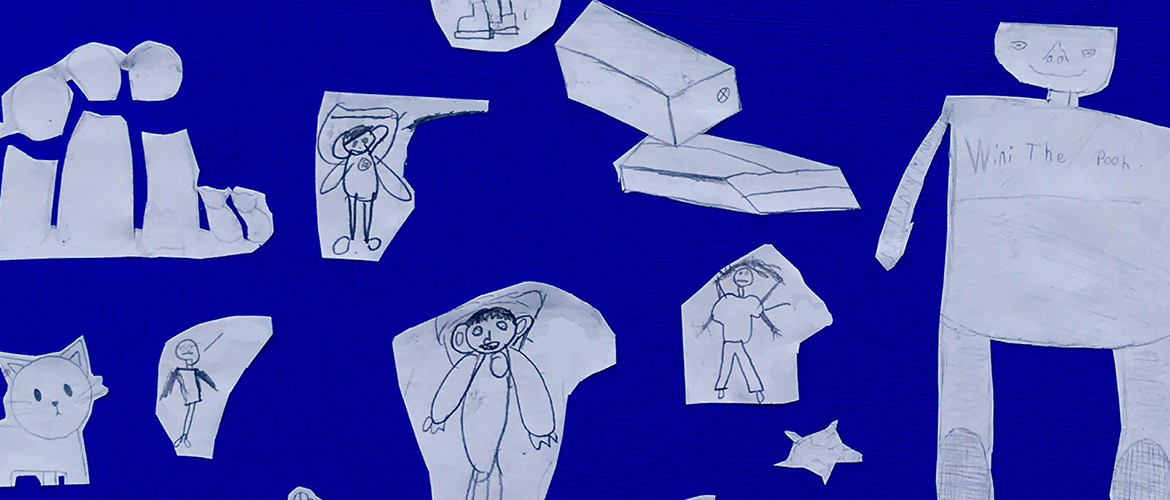Workshop Overview
Created by art practitioner, Izzy Coombs, this workshop aimed to open up the participant’s (children’s) creativity and means of expression when dealing with complicated abstract concepts that arose as themes from the PERCEPTIONS migrant interviews. Two abstract concepts, hope and uncertainty (others can be chosen), were explored during the workshop through a take on the equally abstract artistic method of Papier découpé (cut paper collage), developed by Henri Matisse, utilising more drawing instead of solely cut-out paper shapes.
Description of Activity
Using a more drawing-rich take on abstract artist, Henri Matisse’s, Papier découpé, the participants expressed their perceptions of the abstract concepts, hope and uncertainty (from the PERCEPTIONS migrant interviews), by manifesting their ideas onto white paper that was cut out and placed onto a solid blue board.
Outcomes
Exploratory methodology: reflecting on the process of drawing and its results produced a shifting frame of research and changing perceptions of migration.
Combining multiple methods: collecting various pieces of information and pieces of data (interview quotes, drawings, observations, photographs) developed richer, non-linear understanding of migration.
Producing artefacts: artwork will be displayed in two local art exhibitions in South Wales to stimulate discussion about migration.
Reaching wider: the workshop and its outcomes were shared online through the PERCEPTIONS social media and other channels.
Developing connections: piecing drawings together, relating them to abstract concepts and making them speak to one another stimulated an interpretative process, which helped broaden understanding of key migration themes.
Impact
Drawing helped the participants find their own voice for displaying their understanding of hard to grasp concepts (hope and uncertainty) and feel that their wide-ranging interpretations were treated seriously. Many children (41% of participants) commented that “drawing and cutting shapes” was their favourite activity in the workshop, which helped them to “enjoy different ways of learning about migrant stories”—producing
artefacts that form parts of the summer exhibition gave participants a sense of achievement and made them feel that their contribution mattered.
Visualising migration ensured a positive and inclusive experience, where young people were able to develop empathy towards migrants and understand their perceptions and points of view. Experimentation with unexpected interpretations of key migration themes stimulated interactive learning and discussion over often-overlooked perspectives. The messiness of collage reflected the uncertainty of migration and
acknowledged tensions, relationships and juxtapositions between different fragments of information on cross-border movements.
Art-based activities encouraged participants to try new approaches, prompted them to reflect on unexpected feelings, emotions and perceptions, and gave them confidence in developing new ways of thinking about migration (76% of participants stated that drawing and collage helped them better understand the experiences of migrants). Working with an art practitioner opened new opportunities for creative expression, helped them develop new skills (“I am good at drawing but I learnt a lot of new skills”) and supported their personal progression.
Children’s Feedback
“The collage was nice because I drew something that gave me hope.” (Hafod Primary Pupil)
“My favourite part was drawing and cutting those shape things we made out.” (Hafod Primary Pupil)
“My favourite part of today was drawing what we hoped would happen in the future.” (Hafod Primary Pupil)
Team Involved
Swansea University: Sergei Shubin & Harrison Rees
University of Wales Trinity St. David: Izzy Coombs & Amanda Roberts

